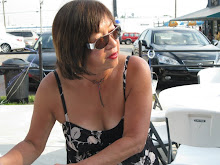 Australian writer Geraldine Brooks
Australian writer Geraldine Brooks10 people met last night to discuss the book at
McKenzie's River Grill on 82nd street.
Those in attendance were Kathy, Betsy, Sarah, Julie,
Nancy, Madeleine, Janet, Donna R., Sue and Nettie.
The restaurant was not noisy and we had a big group
but I still did not hear all the many discussions
which seemed to be going on so forgive me if I
omitted somethings.
Geraldine Brooks has done it again. She has taken a shard of
history and created a beautiful historic novel about
the first Indians who were educated at Harvard.
Caleb's Crossing takes place in Martha's Vineyard
when Bethea the daughter of a Puritan minister/settler
at age 12 encounters a handsome young wamponoag
Indian youth in the wilds and they forge a friendship
learning each other's language and ways. This takes
place in the late 1600's. The young Indian youth is
adopted by Bethea's father who educates him and he
eventually graduates from Harvard. Bethea herself was
denied and education because of her sex while her dim witted
brother was given all the opportunities.
Caleb eventually crosses over into the Anglo-Saxon
culture much to the wrath of his uncle the shaman
of his tribe and that causes some conflicts.
I missed most of the discussion as I was late but
I gathered that everyone thought it was a great book
cleverly wrought in the old English vernacular and those
who had the audible experience confirmed it.
Women's rights and the lack of it chagrined us all.
We talked about the fact that some women in some
countries still are in the dark ages.
There was some discussion as to how historical the
book was and we all agreed that we like to learn history
with a spoon full of sugar. Julie said there is an actual
archaeological dig in progress to unearth the remains
of the Indian College in the Harvard yard.
Of course we discussed the fact that the bible thumping
pioneers imposed their religion on the noble Indian
whose gods were nature driven. They gave them small pox
and used the cure to convince them that their God was
more powerful. Trickery and deceit was always the
way with the treaties. But so many other books
confirm this.
We think the author could have romanticized the
relationship between Bethea and Caleb but thought
it best that she didn't.
It was a powerful book and we thank Madeleine for
choosing so wisely.
Sue chose a book for the next read. It is entitled,
"The Fault In Our Stars" by John Green.
I was surprised to see it was listed as children's fiction
as it deals with coping with cancer. Perhaps it is
because the victims are teenagers. It is actually set in
Indianapolis and is complete fiction.
Seems a bit different but different is good.
March 14th was earmarked for the next meeting.


